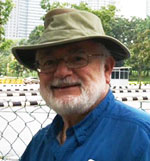Justin Spring, The Gourmands’ Way, Six Americans in Paris and the Birth of a New Gastronomy; Farrar, Straus and Giroux (2017)
© Oliver B. Pollak

RICHMOND, California — This exuberant, well written, knowledgeable, and educational romp along French mid-century trans-Atlantic food and wine trails is a delicious book on the Gallic influence on food and wine in America, multiple marriages, and the openness gay, lesbian, and bisexuals enjoyed in France. It is a study of the rich and struggling, the famous and wannabees.
The title is reminiscent of Marcel Proust’s Swann’s and Guermantes Way. The 17-page index of this 433-page book, covering 1920 to 1965, does not mention “anti-Semitism,” “Holocaust,” “Jew” or “Nazi,” but the book contains such things.
Three gastronomic pioneers, Alice B. Toklas, A. J. Liebling, and Alexis Lichine, were born Jewish. And Julia Child, M.F.K. Fisher and Richard Olney benefitted from a Jewish food chain of financing, researchers, lovers, editors and publishers. Alfred A. Knopf published Child, Fisher, Lichine, and Liebling.
Spare but telling Jewish details, intimate friendships and dislikes comprise an important backstory of networks. The three leading Jewish characters effaced, obscured, ignored or rejected their original faith, in what Brandeis University Professor Stephen J. Whitfield has described as “bleaching out their origins.”
Toklas, Liebling and Lichine did not appear at ease with their faith. Alice B. Toklas, the subject of life partner Gertrude Stein’s The Autobiography of Alice B. Toklas (1933), had a German-Jewish heritage. Though Jewish they stayed in France during the World War II improbably protected by their anti-Semitic fascist friend Bernard Fay. Toklas helped Fay, a convicted collaborator, to escape to Sweden. Toklas published The Alice B. Toklas Cookbook in 1954, the first edition of which contained Brion Gysin’s recipe for Haschich Fudge. She started her conversion to Catholicism in 1956.
Abbott Joseph Liebling went by A.J. His father, an Austrian Jew, a penniless immigrant, developed a flourishing fur business. A.J. had three Gentile wives. He was a war reporter in Paris when the Allies liberated it. A New Yorker contributor, he wrote about food, wine and boxing. But as a Jew, his third wife commented, “Even Hitler didn’t make him an intensely self-conscious Jew,” according to Professor Whitfield.
Alexis Lichine, born in Moscow in 1913 to a prosperous Jewish family, had two and a half Gentile wives, the second, half Jewish. who left after about eight years. He then married actress Arlene Dahl. An incessant salesman and ambitious businessman, he wrote at least four guides and encyclopedias about French wine. His clients included the Waldorf Astoria. The Lichine label raised the visibility of French wine in America.
A few additional Jewish supporting luminaries mentioned by author Spring include New Yorker writer Joseph Wechsberg, a Czech writer, who received asylum in America in 1939. Much of his family was not so fortunate, they lost their lives in concentration camps. Poppy Cannon, a popular food columnist and cookbook writer, born Lillian Gruskin, in Cape Town’s Lithuanian community, described herself as the “First Lady of American Cooking.”
Toklas, Lichine, and Olney died in France. Perhaps Iowa-born autodidact Richard Olney is the book’s star. Although not Jewish, he paired for a time with Elliot Stern, “a short, boyish, bearlike Jewish-American intellectual, critic and writer” living in Paris, described at his death in 2012 in the Village Voice as a “queer, Jewish, Brooklynite,” Olney had a close relationship with Sybille Bedford, the German half Jewish novelist, journalist and lesbian. Olney influenced Alice Waters, new American gastronomy, and gastro tourism.
If American Jews were not into French gastronomy, French cuisine and wine may have taken a different and longer path to America. Perhaps disinterest in their Jewishness facilitated French food, by trying to remake themselves. Spring labored almost a decade to produce this masterpiece.
*
Pollak, a professor emeritus of history at the University of Nebraska at Omaha, is a freelance writer now based in Richmond, California.